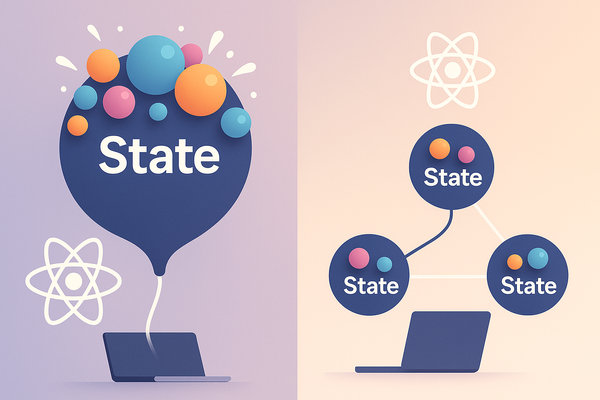Laid Off. Burned Out. Then Hired as a Senior Engineer.
How Do I Begin?
Maybe I should start with a timeline — something to align my story with what was happening in the company.
Because this journey didn’t just happen in 2 or 3 months.
It took 6 to 7 months of uncertainty, stress, decisions, and consequences.
Everything felt like a chain reaction — sebab akibat. One thing led to another.
Timeline: When Everything Changed
Mid 2024 — Rumors Start
It all started around May–June 2024. There were rumors. Layoffs. No one knew how many. No one knew when. But one thing was clear: they were coming. Management told us directly.
That’s when I started preparing. I looked for new jobs. I tried to learn new things. But honestly, I didn’t see any hope. Most of my job search ended at the live interview stage — I didn’t pass. I lacked experience. I hadn’t grinded enough Leetcode/Hackerrank.
Even take-home tests didn’t go well. Often, my way of thinking didn’t align with the interviewers — things like state management, function design, or how I structured my code.
This was the first time I realized the importance of best practices and clean code. Every senior has their own style, goals, and “mazhab” in Frontend. If you don’t align, you get rejected. There’s no silver bullet.
Reality Hits — And So Does Burnout
I felt stuck. Hopeless. I started seeing a psychologist — not just for my career, but because I was afraid it might affect my relationship too.
Mid–Late 2024 — Layoffs Begin
The first wave of layoffs hit. Then came more rumors — another round was expected in early 2025.
It was confusing. In October 2024, the company even launched a new chapter in India. But I stopped thinking about it. If I got laid off, at least they’d pay me fairly. I’d already applied to many jobs and faced so many rejections. I needed a new plan.
So I built more. Learned more. Contacted people for help. I started setting up 1:1 and took notes from each one.

People I reached out to:
- Iqbal Farabi, Manager at Booking,
- Doni Rubiagatra, Head of Engineer ZOG
- Angkin, Engineer at Lokamining
- Indra Zulfi, Mentor at DevScale
- Muhammad Affifudin, Senior Eng at eFishery
- Irvan Ariyanto, Senior Eng at GDPLab
- Didik Trisusanto, Senior Engineer at Omcom
- Irfan Maulana, ex-GovTech Edu
Each conversation was different. I asked about:
- Leadership
- Becoming a Senior
- Job interview prep
- Mock/live coding
- Surviving in Tech Winter
- How prepare for laiyoff
During this time, I didn’t apply to many jobs. I focused on learning — especially Frontend fundamentals and problem-solving. A few recruiters approached me because I had set my LinkedIn to "open to work." But at the same time, it became overwhelming. I still had to work 9 to 5, handle side projects, and deal with a flood of recruiter messages. It started to blur everything. I tried to set priorities, but it kept falling apart. The companies I really wanted? Rejected me. Some recruiters ghosted me. And sometimes, I ghosted them back. I was lost in the noise.
Early 2025 — More Pressure, More Problems
I kept learning, but the stress didn’t stop. More rumors. More uncertainty. It started affecting my health — I broke out with acne from the pressure.
So I tried a coping mechanism: video games. At that time, I got into Factorio. It helped. It didn’t fix everything, but it gave me something — a bit of happiness, or at least less stress.
That’s why my playtime hit 200+ hours. Shoutout to Mas Didik Wicaksono for introducing me to the game. In a weird way, Factorio became part of my survival toolkit.

By now, the rumors were real. The company was falling apart. A full collapse felt near. I needed out.
Still, in February, nothing had worked. No offers. No clear next step. I stopped tracking job applications. I started thinking, “How about a career break?”
Could I survive 2–3 months with my last salary? Maybe. I talked to my girlfriend — she supported the idea of taking a break. But doubt hit me hard:
“Are you sure? Remember you’re sandwich gen. A break is not an option.”
“You can survive — but what about helping other family members?”
Even with her approval, I didn’t feel peace. The real goal of the break wasn’t to rest — it was to reset.
I wanted to use that time to:
- Learn Full Stack development
- Build personal projects
- Strengthen my portfolio
- Strengthen my knowledge
So I could prepare better.
Because getting rejected over and over again? That was exhausting.
If I had a chance to stop, rebuild, and come back stronger — maybe next time, I’d get better results.
Even then, I didn’t stop trying. I shifted my strategy.
I leaned into the network I had built — not just recently, but since my first year of working. From the start, I’ve always believed in building real connections.
Fun fact: 100% of my jobs came from friends’ recommendations. Maybe this time would be the same? No harm in trying, right?
So I reached out — friends from WFC, Twitter, and College. I asked if their companies were hiring, if they could refer me, or if they knew anyone who was looking. I had nothing to lose. At this point, networking was part of my job search strategy.
A New Hope — February 2025
Finally, some hope.
Three companies responded around early February:
Company A
- US-based
- Remote
- Mature product
- Third interview: with user
Company B
- US-based
- Remote
- Founding Engineer role
- Third interview: with user
Company C
- Indonesia-based
- WFO
- Mature ecosystem
- Second interview: with user
All three came at once. And all of them offered a +40% salary increase compared to my previous job. I couldn’t believe it.
And remember those friends I contacted?
Those three companies came through them.
One from WFC, two from Twitter. That’s why I believe in building credibility, and keep showing off. Just being consistent, sharing my journey, and staying connected brought real results.
At the same time, my current company announced another massive layoff. It felt surreal — like the universe was pushing me toward the next chapter, just when I needed it most.
So I focused on those interviews. I had time — no more 9-to-5 — and used it to prepare.
Company B felt promising — fast process, Founding Engineer role, exciting opportunity.
Company C? Honestly, I didn’t think much about it at first. It was WFO, and I preferred WFH after getting used to remote culture at my last company. But they surprised me. After just two interviews, they gave really good feedback and sent an offer. No take-home test. No unnecessary rounds.
It was actually faster than the others — even Company B, which also moved quickly but still required a take-home test.
Company C? Just interviews. That’s it.
I told Company B about Company C’s offer. They followed up with their own offer.
Decision Time
Now I had to choose between B and C.
After thinking it through, I chose Company C. (I’ll write a separate post about why.)
Once I accepted, the recruiter asked when I could start. I said, "As soon as possible."
He replied, “Okay, you can start on March 3st.”
I was only unemployed for two weeks. That’s why my unemployed journal ended on day 2. Things moved fast.
A Dream Title
Now I have the title I dreamed of: Senior Software Engineer.

Some people say titles don’t matter. But to me, they do:
- It impacts salary
- It opens doors other oppoturnity
- It brings you one step closer to becoming a Manager or Lead
Don’t believe rich people when they say “money doesn’t matter.”
Don’t believe people with titles when they say “titles don’t matter.”
Everything matters.
Where I Am Now
I’m almost done with probation. Working WFO. Adapting to a corporate culture in a product-focused company.
This shift changed my mindset.
Now, I don’t just want to be a Frontend Developer.
I want to be a Software Engineer.
And that’s why I wrote all this — to share my story, how I survived, how I learned, and how I finally made it.


